Vegan Egg Market
Vegan Egg Market Size and Share Forecast Outlook 2025 to 2035
Vegan egg market is projected to grow from USD 1.2 billion in 2025 to USD 3.0 billion by 2035, at a CAGR of 9.6%. Liquid will dominate with a 48.0% market share, while bakery will lead the application segment with a 39.0% share.
Vegan Egg Market Forecast and Outlook 2025 to 2035
The global vegan egg market is valued at USD 1.2 billion in 2025. It is slated to reach USD 3 billion by 2035, recording an absolute increase of USD 1.8 billion over the forecast period. This translates into a total growth of 150.0%, with the market forecast to expand at a compound annual growth rate (CAGR) of 9.6% between 2025 and 2035.
The overall market size is expected to grow by nearly 2.5X during the same period, supported by increasing plant-based diet adoption, growing awareness of egg allergies and dietary restrictions, rising environmental consciousness and animal welfare concerns, and expanding applications in food manufacturing and culinary use.
Quick Stats for Vegan Egg Market
- Vegan Egg Market Value (2025): USD 1.2 billion
- Vegan Egg Market Forecast Value (2035): USD 3 billion
- Vegan Egg Market Forecast CAGR: 9.6%
- Leading Protein Type in Vegan Egg Market: Mung/Legume
- Key Growth Regions in Vegan Egg Market: North America, Europe, and Asia-Pacific
- Key Players in Vegan Egg Market: Eat Just, The EVERY Company, Oggs, Follow Your Heart, AcreMade, Orgran
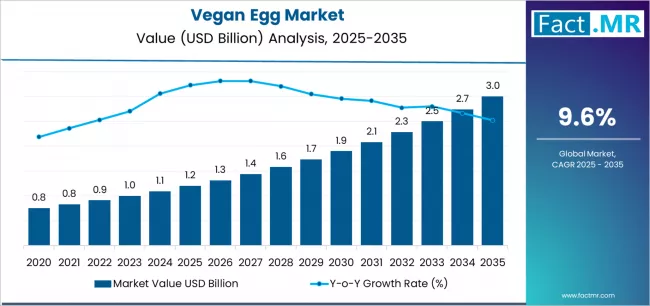
Between 2025 and 2030, the vegan egg market is projected to expand from USD 1.2 billion to USD 1.9 billion, resulting in a value increase of USD 0.7 billion, which represents 38.9% of the total forecast growth for the decade. This phase of development will be shaped by increasing mainstream acceptance of plant-based alternatives, growing food manufacturing adoption, and expanding culinary applications. Alternative protein companies and food ingredient suppliers are expanding their vegan egg capabilities to address the growing demand for versatile egg replacement solutions.
Vegan Egg Market Key Takeaways
| Metric | Value |
|---|---|
| Estimated Value in (2025E) | USD 1.2 billion |
| Forecast Value in (2035F) | USD 3 billion |
| Forecast CAGR (2025 to 2035) | 9.6% |
From 2030 to 2035, the market is forecast to grow from USD 1.9 billion to USD 3 billion, adding another USD 1.1 billion, which constitutes 61.1% of the overall ten-year expansion. This period is expected to be characterized by the expansion of foodservice applications, development of specialized functional formulations, and growth of novel protein sources and production technologies. The growing adoption of plant-based cooking and food innovation will drive demand for vegan eggs with enhanced functionality and culinary versatility.
Between 2020 and 2025, the vegan egg market experienced rapid growth, driven by increasing awareness of animal welfare issues and growing recognition of vegan eggs as innovative alternatives that combine culinary functionality with ethical consumption. The market developed as conscious consumers and innovative food companies recognized the potential for vegan egg technology to replicate traditional egg functions, support diverse dietary needs, and provide sustainable alternatives while maintaining cooking performance and nutritional benefits.
Why is the Vegan Egg Market Growing?
Market expansion is being supported by the increasing consumer shift toward plant-based eating driven by health consciousness and ethical considerations, alongside the corresponding need for egg alternatives that can provide functional versatility, support dietary restrictions, and deliver culinary performance across various cooking applications and food manufacturing processes. Modern alternative protein companies and food manufacturers are increasingly focused on implementing vegan egg solutions that can replicate traditional egg functions, support diverse culinary applications, and provide convenient alternatives while maintaining cooking performance and nutritional adequacy.
The growing emphasis on allergen-free foods and dietary inclusivity is driving demand for vegan eggs that can support egg allergy management, enable inclusive cooking, and ensure comprehensive dietary accommodation through plant-based formulations that eliminate common allergens. Food manufacturers' preference for ingredients that combine functionality with ethical positioning and dietary inclusivity is creating opportunities for innovative vegan egg implementations. The rising influence of environmental sustainability and animal welfare concerns is also contributing to increased adoption of vegan eggs that can provide superior ethical credentials without compromising culinary functionality or cooking satisfaction.
Segmental Analysis
The market is segmented by product type, application, and protein source. By product type, the market is divided into liquid, powder, and frozen/others. Based on application, the market is categorized into bakery, home cooking, and sauces/foodservice. By protein source, the market is segmented into mung/legume, soy/pea, and others.
By Product Type, the Liquid Segment Leads the Market
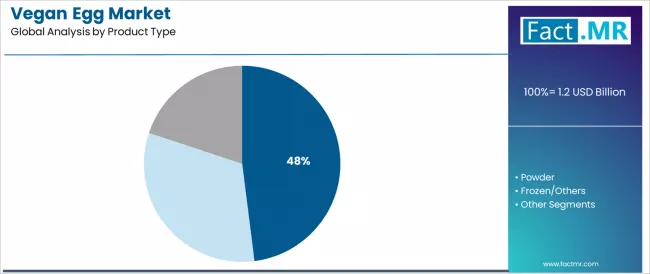
The liquid segment is projected to maintain its leading position in the vegan egg market in 2025 with a 48% market share, reaffirming its role as the preferred format for vegan egg consumption due to convenience and versatility advantages. Vegan egg manufacturers and consumers increasingly utilize liquid formats for their ready-to-use characteristics, cooking convenience, and proven effectiveness in replicating traditional liquid egg applications while supporting diverse culinary uses and food preparation requirements. Liquid format's proven effectiveness and consumer convenience directly address market requirements for immediate cooking application and culinary versatility across diverse preparation methods and recipe applications.
This product segment forms the foundation of culinary egg replacement, as it represents the format with the greatest contribution to cooking authenticity and established consumer familiarity across multiple cooking techniques and recipe categories. Alternative protein industry investments in liquid formulation technologies continue to strengthen adoption among manufacturers and home cooks. With consumer preferences requiring cooking convenience and authentic functionality, liquid vegan eggs align with both culinary objectives and preparation convenience, making them the central component of comprehensive egg replacement strategies.
By Application, the Bakery Segment Dominates Market Demand
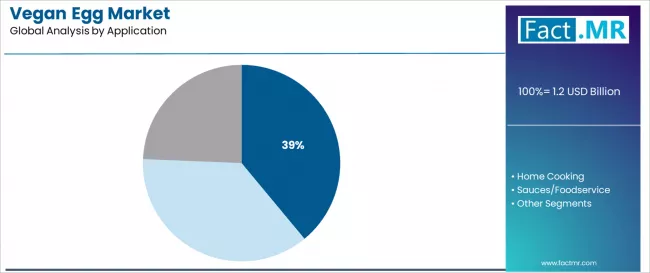
The bakery application segment is projected to represent the largest share of vegan egg demand in 2025 with a 39% market share, underscoring its critical role as the primary driver for vegan egg utilization across commercial baking, artisanal production, and home baking applications. Bakers prefer vegan eggs for their exceptional binding properties, leavening capabilities, and proven effectiveness in creating quality baked goods while supporting vegan formulations and dietary inclusivity. Positioned as essential ingredients for inclusive baking, vegan eggs offer both functional performance and dietary accommodation advantages.
The segment is supported by continuous innovation in baking technology and the growing availability of specialized vegan egg formulations that enable superior baking performance with enhanced texture, rise, and taste characteristics. Additionally, bakery manufacturers are investing in comprehensive vegan formulation programs to support increasingly diverse vegan egg applications and consumer demand for inclusive baked goods. As plant-based baking increases and dietary inclusion requirements grow, the bakery application will continue to dominate the market while supporting advanced formulation strategies and baking performance optimization.
What are the Drivers, Restraints, and Key Trends of the Vegan Egg Market?
The vegan egg market is advancing rapidly due to increasing plant-based lifestyle adoption driven by health consciousness and ethical considerations, alongside growing demand for allergen-free alternatives that provide culinary functionality, support dietary restrictions, and deliver cooking performance while addressing animal welfare concerns and environmental sustainability objectives across various consumer demographics and culinary applications. However, the market faces challenges, including complex functional replication requirements, higher costs compared to conventional eggs, and consumer acceptance barriers regarding taste and texture authenticity. Innovation in protein technology and functional optimization continues to influence product performance and market expansion patterns.
Expansion of Food Manufacturing and Industrial Applications
The growing food manufacturing sector is driving demand for vegan eggs that can provide consistent functionality, scalable production benefits, and regulatory compliance through standardized formulations that enable reliable performance in commercial food production, bakery operations, and processed food manufacturing. Food manufacturers require advanced vegan egg formulations that deliver superior functional results across multiple production parameters while maintaining cost effectiveness and supply chain reliability. Food companies are increasingly recognizing the competitive advantages of vegan egg integration for inclusive product development and market differentiation, creating opportunities for specialized ingredients designed for commercial food production and manufacturing excellence applications.
Integration of Advanced Protein Technology and Functionality Enhancement
Modern vegan egg manufacturers are incorporating cutting-edge protein technology and functionality enhancement methods to improve product performance, enhance consumer acceptance, and support comprehensive culinary applications through innovative processing techniques, protein optimization, and functional ingredient combinations. Leading companies are developing proprietary protein technologies, implementing advanced processing methods, and advancing formulation science that maximizes egg-like functionality while maintaining nutritional value and cost competitiveness. These technologies improve product quality while enabling new market opportunities, including premium culinary applications, specialized foodservice solutions, and discerning consumer segments seeking authentic plant-based alternatives.
Development of Novel Protein Sources and Sustainable Production
The expansion of protein innovation and sustainable production methods is driving demand for next-generation vegan eggs utilizing novel protein sources including algae, fermentation-derived proteins, and advanced plant proteins that provide enhanced nutritional profiles and unique functional characteristics. These innovative applications require cutting-edge biotechnology capabilities and specialized processing systems that exceed traditional plant protein production requirements, creating differentiated market segments with enhanced value propositions. Manufacturers are investing in protein research and sustainable production technologies to serve emerging applications while supporting innovation in alternative protein development and environmental responsibility initiatives.
Analysis of the Vegan Egg Market by Key Countries
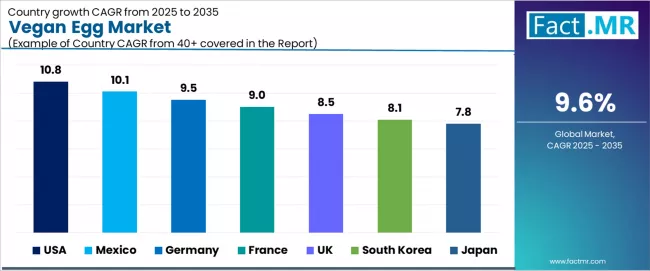
| Country | CAGR (2025-2035) |
|---|---|
| USA | 10.8% |
| Mexico | 10.1% |
| Germany | 9.5% |
| France | 9.0% |
| UK | 8.5% |
| South Korea | 8.1% |
| Japan | 7.8% |
The vegan egg market is experiencing exceptional growth globally, with the USA leading at a 10.8% CAGR through 2035, driven by extensive plant-based movement, advanced food technology innovation, and strong consumer interest in egg alternatives supporting vegan egg development. Mexico follows at 10.1%, supported by growing plant-based awareness, expanding food manufacturing sector, and increasing availability of alternative protein products. Germany shows growth at 9.5%, emphasizing sustainability leadership, animal welfare consciousness, and advanced food technology applications. France demonstrates 9.0% growth, supported by culinary innovation, ethical consumption trends, and premium food market development. The UK records 8.5%, focusing on plant-based lifestyle adoption, allergen awareness, and sustainable food innovation. South Korea exhibits 8.1% growth, emphasizing food technology advancement and premium alternative proteins. Japan shows 7.8% growth, supported by health consciousness and quality food innovation preferences.
USA Leads Global Market Growth with Alternative Protein Leadership
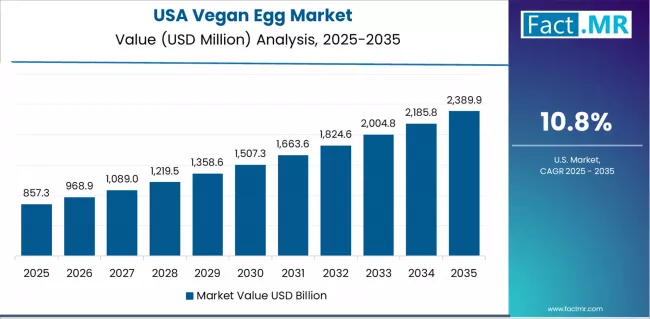
Revenue from vegan eggs in the USA is projected to exhibit exceptional growth with a CAGR of 10.8% through 2035, driven by extensive plant-based movement development and rapidly growing alternative protein innovation supporting vegan egg adoption among health-conscious consumers, ethical food enthusiasts, and progressive food manufacturers. The country's advanced food technology infrastructure and increasing consumer acceptance of egg alternatives are creating substantial demand for vegan egg solutions. Major alternative protein companies and food manufacturers are establishing comprehensive research and development capabilities to serve both domestic markets and export opportunities.
- Strong plant-based movement and food innovation culture are driving demand for vegan eggs throughout specialty stores, mainstream supermarkets, and food manufacturing facilities across urban markets, health communities, and environmentally conscious consumer segments.
- Growing alternative protein investment and technological advancement are supporting the rapid development of innovative vegan egg formulations among companies seeking functionality advantages and competitive positioning in the expanding alternative protein market.
Mexico Demonstrates Strong Market Potential with Food Manufacturing Growth
Revenue from vegan eggs in Mexico is expanding at a CAGR of 10.1%, supported by the country's growing plant-based awareness, expanding food manufacturing sector, and increasing consumer interest in alternative protein products and inclusive dietary solutions. The country's evolving food industry and health consciousness trends are driving demand for functional vegan egg products throughout manufacturing and consumer markets. Leading alternative protein brands and food manufacturers are establishing comprehensive production facilities to address growing demand for egg alternatives.
- Rising plant-based awareness and expanding food manufacturing are creating opportunities for vegan egg adoption across commercial bakeries, food processors, and retail channels in major industrial regions and urban markets.
- Growing health consciousness and dietary inclusivity interest are driving adoption of vegan egg products among consumers and manufacturers seeking allergen-free solutions and ethical food alternatives for diverse culinary applications.
Germany Demonstrates Innovation Excellence with Sustainability Leadership
Revenue from vegan eggs in Germany is expanding at a CAGR of 9.5%, driven by the country's sustainability leadership, animal welfare consciousness, and comprehensive approach to alternative protein innovation supporting evidence-based vegan egg development. Germany's environmental awareness and ethical consumption focus are driving demand for sustainable vegan egg solutions. Leading sustainability-focused companies and alternative protein manufacturers are establishing comprehensive innovation programs for ethical food development.
- Advanced sustainability standards and consumer preference for animal welfare products are creating demand for vegan eggs among environmentally conscious consumers seeking ethical alternatives and sustainable food choices.
- Strong animal welfare consciousness and alternative protein innovation are supporting the adoption of certified vegan egg formulations across organic retailers, ethical food stores, and sustainability-focused consumer markets throughout major urban regions.
France Focuses on Culinary Excellence and Premium Innovation
Revenue from vegan eggs in France is expanding at a CAGR of 9.0%, driven by the country's culinary innovation leadership, ethical consumption trends, and comprehensive approach to premium alternative food experiences supporting vegan egg integration into sophisticated culinary applications. France's gastronomic excellence and innovation culture are supporting investment in advanced vegan egg technologies. Major culinary companies and premium food manufacturers are establishing comprehensive innovation programs incorporating vegan eggs with French culinary expertise.
- Advanced culinary standards and consumer preference for premium ingredients are creating demand for high-quality vegan eggs throughout professional kitchens, artisanal bakeries, and gourmet food applications serving sophisticated consumer segments.
- Strong culinary innovation and premium positioning preferences are driving the adoption of artisanal vegan egg applications meeting high performance standards and sophisticated culinary requirements across diverse premium food categories.
UK Shows Market Leadership with Plant-Based Integration
Revenue from vegan eggs in the UK is expanding at a CAGR of 8.5%, supported by the country's plant-based lifestyle adoption, allergen awareness, and growing interest in sustainable food innovation and dietary inclusivity supporting vegan egg adoption across mainstream and specialty market segments. The UK's ethical food culture and inclusion focus are driving demand for innovative vegan egg solutions. Leading plant-based brands and inclusive food companies are investing in product innovation and consumer education for alternative protein markets.
- Advanced plant-based lifestyle adoption and consumer interest in allergen-free solutions are creating opportunities for vegan eggs throughout health retailers, mainstream supermarkets, and specialty food stores serving inclusive consumer segments.
- Strong allergen awareness and dietary inclusivity trends are driving the adoption of vegan egg formulations across food manufacturing, bakery operations, and foodservice establishments targeting allergen-conscious and ethically minded consumers.
South Korea Demonstrates Technology Leadership with Food Innovation
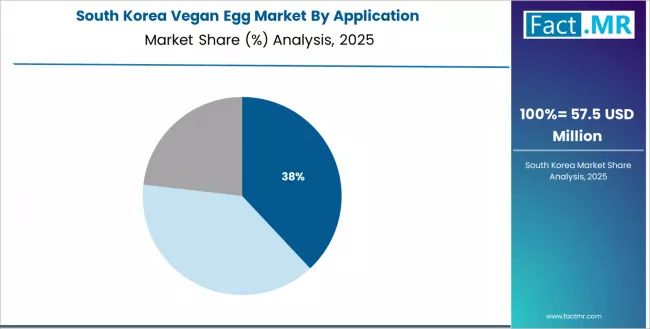
Revenue from vegan eggs in South Korea is expanding at a CAGR of 8.1%, supported by the country's food technology advancement, premium alternative protein market, and strong emphasis on culinary innovation and quality food products supporting sophisticated vegan egg utilization. The nation's food technology capabilities and innovation culture are driving demand for advanced vegan egg solutions. Leading food technology companies are investing extensively in premium product development and alternative protein market expansion.
- Advanced food technology capabilities and premium alternative protein demand are creating demand for vegan eggs throughout specialty food stores, innovative restaurants, and premium food manufacturers serving quality-conscious consumer segments.
- Strong culinary innovation and food technology focus are supporting the adoption of vegan egg formulations designed for authentic functionality, premium positioning, and culinary excellence across diverse consumer demographics and professional applications.
Japan Shows Premium Focus with Quality Innovation
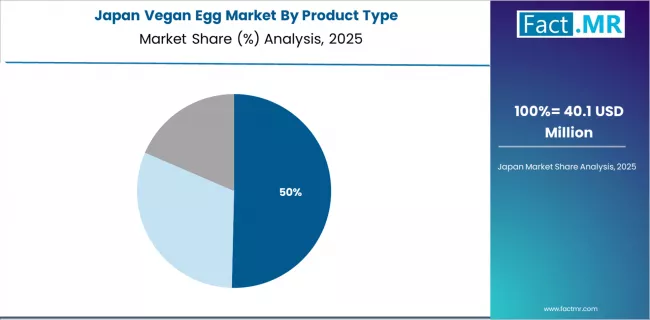
Revenue from vegan eggs in Japan is expanding at a CAGR of 7.8%, supported by the country's health consciousness, quality food innovation preferences, and strong emphasis on functional foods and wellness supporting vegan egg adoption for health maintenance and dietary optimization. Japan's quality culture and food innovation expertise are driving demand for premium vegan egg products. Leading health companies are investing in specialized capabilities for functional food applications and quality-driven product development.
- Advanced health consciousness and quality food focus are creating opportunities for vegan eggs throughout specialty food retailers, health stores, and premium food channels serving health-conscious consumers seeking functional food alternatives.
- Strong quality standards and functional food expertise are driving adoption of premium vegan egg formulations meeting Japanese consumer expectations for functionality, nutritional value, and comprehensive health benefits across diverse culinary applications.
Europe Market Split by Country
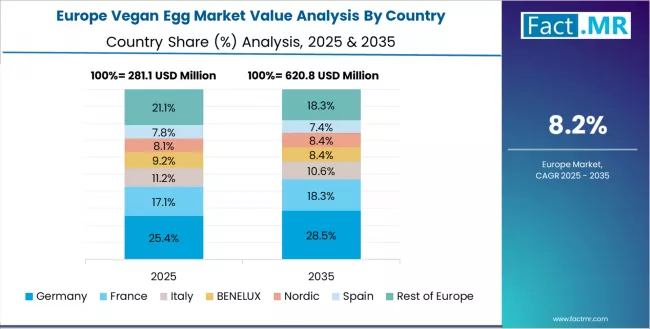
The vegan egg market in Europe is projected to grow from USD 340.0 million in 2025 to USD 850.0 million by 2035, registering a CAGR of 9.0% over the forecast period. Germany is expected to maintain leadership with a 29.4% market share in 2025, moderating to 29.1% by 2035, supported by sustainability leadership, animal welfare consciousness, and advanced alternative protein development.
France follows with 25.0% in 2025, projected to reach 25.3% by 2035, driven by culinary innovation leadership, ethical consumption trends, and premium alternative food market development. The United Kingdom holds 23.5% in 2025, expected to reach 23.7% by 2035 due to plant-based lifestyle adoption and allergen awareness trends. Italy commands 12.4% in 2025, rising to 12.5% by 2035, while Spain accounts for 7.4% in 2025, reaching 7.5% by 2035. The Rest of Europe region is anticipated to hold 2.3% in 2025 and 1.9% by 2035, reflecting steady alternative protein adoption in Nordic countries and emerging plant-based food markets in Eastern European countries.
Competitive Landscape of the Vegan Egg Market
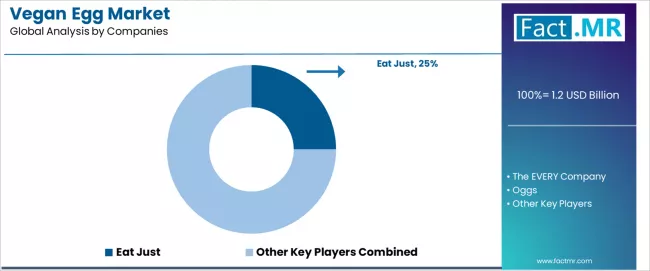
The vegan egg market is characterized by competition among innovative alternative protein startups, established plant-based companies, and food ingredient specialists. Companies are investing in protein technology development, functional optimization research, production scaling capabilities, and application development to deliver authentic, versatile, and accessible vegan egg solutions. Innovation in texture replication, binding functionality, and cost optimization is central to strengthening market position and competitive advantage.
Eat Just leads the market with a 25% share, offering comprehensive vegan egg solutions with focus on functionality authenticity, sustainability messaging, and extensive application versatility serving conscious consumers and food manufacturers. The company continues investing in research and development while expanding production capacity and market penetration. The EVERY Company provides biotechnology innovation with emphasis on precision fermentation and protein optimization. Oggs focuses on consumer-friendly formulations and mainstream accessibility. Follow Your Heart emphasizes established alternative food expertise with diverse applications. AcreMade specializes in foodservice and commercial applications. Orgran provides gluten-free and allergen-friendly positioning.
Key Players in the Vegan Egg Market
- Eat Just
- The EVERY Company
- Oggs
- Follow Your Heart
- AcreMade
- Orgran
- Ingredion
- Puratos
- IFF
- Kerry
Scope of the Report
| Items | Values |
|---|---|
| Quantitative Units (2025) | USD 1.2 billion |
| Product Type | Liquid, Powder, Frozen/Others |
| Application | Bakery, Home Cooking, Sauces/Foodservice |
| Protein Source | Mung/Legume, Soy/Pea, Others |
| Regions Covered | North America, Europe, Asia-Pacific, Latin America, Middle East & Africa |
| Countries Covered | USA, Mexico, Germany, France, UK, Japan, South Korea, and 40+ countries |
| Key Companies Profiled | Eat Just, The EVERY Company, Oggs, Follow Your Heart, AcreMade, Orgran |
| Additional Attributes | Dollar sales by product type and application, regional demand trends, competitive landscape, technological advancements in plant-based egg production, functional replication innovation, protein technology development, and culinary application optimization |
Vegan Egg Market by Segments
-
Product Type :
- Liquid
- Powder
- Frozen/Others
-
Application :
- Bakery
- Home Cooking
- Sauces/Foodservice
-
Protein Source :
- Mung/Legume
- Soy/Pea
- Others
-
Region :
-
North America
- United States
- Canada
- Mexico
-
Europe
- Germany
- United Kingdom
- France
- Italy
- Spain
- Netherlands
- Rest of Europe
-
Asia-Pacific
- Japan
- South Korea
- China
- India
- Australia
- Rest of Asia-Pacific
-
Latin America
- Brazil
- Argentina
- Rest of Latin America
-
Middle East & Africa
- Kingdom of Saudi Arabia
- South Africa
- Rest of Middle East & Africa
-
Table of Content
- Executive Summary
- Global Market Outlook
- Demand to side Trends
- Supply to side Trends
- Technology Roadmap Analysis
- Analysis and Recommendations
- Market Overview
- Market Coverage / Taxonomy
- Market Definition / Scope / Limitations
- Market Background
- Market Dynamics
- Drivers
- Restraints
- Opportunity
- Trends
- Scenario Forecast
- Demand in Optimistic Scenario
- Demand in Likely Scenario
- Demand in Conservative Scenario
- Opportunity Map Analysis
- Product Life Cycle Analysis
- Supply Chain Analysis
- Investment Feasibility Matrix
- Value Chain Analysis
- PESTLE and Porter’s Analysis
- Regulatory Landscape
- Regional Parent Market Outlook
- Production and Consumption Statistics
- Import and Export Statistics
- Market Dynamics
- Global Market Analysis 2020 to 2024 and Forecast, 2025 to 2035
- Historical Market Size Value (USD Million) Analysis, 2020 to 2024
- Current and Future Market Size Value (USD Million) Projections, 2025 to 2035
- Y to o to Y Growth Trend Analysis
- Absolute $ Opportunity Analysis
- Global Market Pricing Analysis 2020 to 2024 and Forecast 2025 to 2035
- Global Market Analysis 2020 to 2024 and Forecast 2025 to 2035, By Product Type
- Introduction / Key Findings
- Historical Market Size Value (USD Million) Analysis By Product Type , 2020 to 2024
- Current and Future Market Size Value (USD Million) Analysis and Forecast By Product Type , 2025 to 2035
- Liquid
- Powder
- Frozen/Others
- Y to o to Y Growth Trend Analysis By Product Type , 2020 to 2024
- Absolute $ Opportunity Analysis By Product Type , 2025 to 2035
- Global Market Analysis 2020 to 2024 and Forecast 2025 to 2035, By Application
- Introduction / Key Findings
- Historical Market Size Value (USD Million) Analysis By Application, 2020 to 2024
- Current and Future Market Size Value (USD Million) Analysis and Forecast By Application, 2025 to 2035
- Bakery
- Home Cooking
- Sauces/Foodservice
- Y to o to Y Growth Trend Analysis By Application, 2020 to 2024
- Absolute $ Opportunity Analysis By Application, 2025 to 2035
- Global Market Analysis 2020 to 2024 and Forecast 2025 to 2035, By Region
- Introduction
- Historical Market Size Value (USD Million) Analysis By Region, 2020 to 2024
- Current Market Size Value (USD Million) Analysis and Forecast By Region, 2025 to 2035
- North America
- Latin America
- Western Europe
- Eastern Europe
- East Asia
- South Asia and Pacific
- Middle East & Africa
- Market Attractiveness Analysis By Region
- North America Market Analysis 2020 to 2024 and Forecast 2025 to 2035, By Country
- Historical Market Size Value (USD Million) Trend Analysis By Market Taxonomy, 2020 to 2024
- Market Size Value (USD Million) Forecast By Market Taxonomy, 2025 to 2035
- By Country
- USA
- Canada
- Mexico
- By Product Type
- By Application
- By Country
- Market Attractiveness Analysis
- By Country
- By Product Type
- By Application
- Key Takeaways
- Latin America Market Analysis 2020 to 2024 and Forecast 2025 to 2035, By Country
- Historical Market Size Value (USD Million) Trend Analysis By Market Taxonomy, 2020 to 2024
- Market Size Value (USD Million) Forecast By Market Taxonomy, 2025 to 2035
- By Country
- Brazil
- Chile
- Rest of Latin America
- By Product Type
- By Application
- By Country
- Market Attractiveness Analysis
- By Country
- By Product Type
- By Application
- Key Takeaways
- Western Europe Market Analysis 2020 to 2024 and Forecast 2025 to 2035, By Country
- Historical Market Size Value (USD Million) Trend Analysis By Market Taxonomy, 2020 to 2024
- Market Size Value (USD Million) Forecast By Market Taxonomy, 2025 to 2035
- By Country
- Germany
- UK
- Italy
- Spain
- France
- Nordic
- BENELUX
- Rest of Western Europe
- By Product Type
- By Application
- By Country
- Market Attractiveness Analysis
- By Country
- By Product Type
- By Application
- Key Takeaways
- Eastern Europe Market Analysis 2020 to 2024 and Forecast 2025 to 2035, By Country
- Historical Market Size Value (USD Million) Trend Analysis By Market Taxonomy, 2020 to 2024
- Market Size Value (USD Million) Forecast By Market Taxonomy, 2025 to 2035
- By Country
- Russia
- Poland
- Hungary
- Balkan & Baltic
- Rest of Eastern Europe
- By Product Type
- By Application
- By Country
- Market Attractiveness Analysis
- By Country
- By Product Type
- By Application
- Key Takeaways
- East Asia Market Analysis 2020 to 2024 and Forecast 2025 to 2035, By Country
- Historical Market Size Value (USD Million) Trend Analysis By Market Taxonomy, 2020 to 2024
- Market Size Value (USD Million) Forecast By Market Taxonomy, 2025 to 2035
- By Country
- China
- Japan
- South Korea
- By Product Type
- By Application
- By Country
- Market Attractiveness Analysis
- By Country
- By Product Type
- By Application
- Key Takeaways
- South Asia and Pacific Market Analysis 2020 to 2024 and Forecast 2025 to 2035, By Country
- Historical Market Size Value (USD Million) Trend Analysis By Market Taxonomy, 2020 to 2024
- Market Size Value (USD Million) Forecast By Market Taxonomy, 2025 to 2035
- By Country
- India
- ASEAN
- Australia & New Zealand
- Rest of South Asia and Pacific
- By Product Type
- By Application
- By Country
- Market Attractiveness Analysis
- By Country
- By Product Type
- By Application
- Key Takeaways
- Middle East & Africa Market Analysis 2020 to 2024 and Forecast 2025 to 2035, By Country
- Historical Market Size Value (USD Million) Trend Analysis By Market Taxonomy, 2020 to 2024
- Market Size Value (USD Million) Forecast By Market Taxonomy, 2025 to 2035
- By Country
- Kingdom of Saudi Arabia
- Other GCC Countries
- Turkiye
- South Africa
- Other African Union
- Rest of Middle East & Africa
- By Product Type
- By Application
- By Country
- Market Attractiveness Analysis
- By Country
- By Product Type
- By Application
- Key Takeaways
- Key Countries Market Analysis
- USA
- Pricing Analysis
- Market Share Analysis, 2024
- By Product Type
- By Application
- Canada
- Pricing Analysis
- Market Share Analysis, 2024
- By Product Type
- By Application
- Mexico
- Pricing Analysis
- Market Share Analysis, 2024
- By Product Type
- By Application
- Brazil
- Pricing Analysis
- Market Share Analysis, 2024
- By Product Type
- By Application
- Chile
- Pricing Analysis
- Market Share Analysis, 2024
- By Product Type
- By Application
- Germany
- Pricing Analysis
- Market Share Analysis, 2024
- By Product Type
- By Application
- UK
- Pricing Analysis
- Market Share Analysis, 2024
- By Product Type
- By Application
- Italy
- Pricing Analysis
- Market Share Analysis, 2024
- By Product Type
- By Application
- Spain
- Pricing Analysis
- Market Share Analysis, 2024
- By Product Type
- By Application
- France
- Pricing Analysis
- Market Share Analysis, 2024
- By Product Type
- By Application
- India
- Pricing Analysis
- Market Share Analysis, 2024
- By Product Type
- By Application
- ASEAN
- Pricing Analysis
- Market Share Analysis, 2024
- By Product Type
- By Application
- Australia & New Zealand
- Pricing Analysis
- Market Share Analysis, 2024
- By Product Type
- By Application
- China
- Pricing Analysis
- Market Share Analysis, 2024
- By Product Type
- By Application
- Japan
- Pricing Analysis
- Market Share Analysis, 2024
- By Product Type
- By Application
- South Korea
- Pricing Analysis
- Market Share Analysis, 2024
- By Product Type
- By Application
- Russia
- Pricing Analysis
- Market Share Analysis, 2024
- By Product Type
- By Application
- Poland
- Pricing Analysis
- Market Share Analysis, 2024
- By Product Type
- By Application
- Hungary
- Pricing Analysis
- Market Share Analysis, 2024
- By Product Type
- By Application
- Kingdom of Saudi Arabia
- Pricing Analysis
- Market Share Analysis, 2024
- By Product Type
- By Application
- Turkiye
- Pricing Analysis
- Market Share Analysis, 2024
- By Product Type
- By Application
- South Africa
- Pricing Analysis
- Market Share Analysis, 2024
- By Product Type
- By Application
- USA
- Market Structure Analysis
- Competition Dashboard
- Competition Benchmarking
- Market Share Analysis of Top Players
- By Regional
- By Product Type
- By Application
- Competition Analysis
- Competition Deep Dive
- Eat Just
- Overview
- Product Portfolio
- Profitability by Market Segments (Product/Age /Sales Channel/Region)
- Sales Footprint
- Strategy Overview
- Marketing Strategy
- Product Strategy
- Channel Strategy
- The EVERY Company
- Oggs
- Follow Your Heart
- AcreMade
- Orgran
- Ingredion
- Puratos
- IFF
- Kerry
- Eat Just
- Competition Deep Dive
- Assumptions & Acronyms Used
- Research Methodology
List Of Table
- Table 1: Global Market Value (USD Million) Forecast by Region, 2020 to 2035
- Table 2: Global Market Value (USD Million) Forecast by Product Type , 2020 to 2035
- Table 3: Global Market Value (USD Million) Forecast by Application, 2020 to 2035
- Table 4: North America Market Value (USD Million) Forecast by Country, 2020 to 2035
- Table 5: North America Market Value (USD Million) Forecast by Product Type , 2020 to 2035
- Table 6: North America Market Value (USD Million) Forecast by Application, 2020 to 2035
- Table 7: Latin America Market Value (USD Million) Forecast by Country, 2020 to 2035
- Table 8: Latin America Market Value (USD Million) Forecast by Product Type , 2020 to 2035
- Table 9: Latin America Market Value (USD Million) Forecast by Application, 2020 to 2035
- Table 10: Western Europe Market Value (USD Million) Forecast by Country, 2020 to 2035
- Table 11: Western Europe Market Value (USD Million) Forecast by Product Type , 2020 to 2035
- Table 12: Western Europe Market Value (USD Million) Forecast by Application, 2020 to 2035
- Table 13: Eastern Europe Market Value (USD Million) Forecast by Country, 2020 to 2035
- Table 14: Eastern Europe Market Value (USD Million) Forecast by Product Type , 2020 to 2035
- Table 15: Eastern Europe Market Value (USD Million) Forecast by Application, 2020 to 2035
- Table 16: East Asia Market Value (USD Million) Forecast by Country, 2020 to 2035
- Table 17: East Asia Market Value (USD Million) Forecast by Product Type , 2020 to 2035
- Table 18: East Asia Market Value (USD Million) Forecast by Application, 2020 to 2035
- Table 19: South Asia and Pacific Market Value (USD Million) Forecast by Country, 2020 to 2035
- Table 20: South Asia and Pacific Market Value (USD Million) Forecast by Product Type , 2020 to 2035
- Table 21: South Asia and Pacific Market Value (USD Million) Forecast by Application, 2020 to 2035
- Table 22: Middle East & Africa Market Value (USD Million) Forecast by Country, 2020 to 2035
- Table 23: Middle East & Africa Market Value (USD Million) Forecast by Product Type , 2020 to 2035
- Table 24: Middle East & Africa Market Value (USD Million) Forecast by Application, 2020 to 2035
List Of Figures
- Figure 1: Global Market Pricing Analysis
- Figure 2: Global Market Value (USD Million) Forecast 2020-2035
- Figure 3: Global Market Value Share and BPS Analysis by Product Type , 2025 and 2035
- Figure 4: Global Market Y to o to Y Growth Comparison by Product Type , 2025-2035
- Figure 5: Global Market Attractiveness Analysis by Product Type
- Figure 6: Global Market Value Share and BPS Analysis by Application, 2025 and 2035
- Figure 7: Global Market Y to o to Y Growth Comparison by Application, 2025-2035
- Figure 8: Global Market Attractiveness Analysis by Application
- Figure 9: Global Market Value (USD Million) Share and BPS Analysis by Region, 2025 and 2035
- Figure 10: Global Market Y to o to Y Growth Comparison by Region, 2025-2035
- Figure 11: Global Market Attractiveness Analysis by Region
- Figure 12: North America Market Incremental Dollar Opportunity, 2025-2035
- Figure 13: Latin America Market Incremental Dollar Opportunity, 2025-2035
- Figure 14: Western Europe Market Incremental Dollar Opportunity, 2025-2035
- Figure 15: Eastern Europe Market Incremental Dollar Opportunity, 2025-2035
- Figure 16: East Asia Market Incremental Dollar Opportunity, 2025-2035
- Figure 17: South Asia and Pacific Market Incremental Dollar Opportunity, 2025-2035
- Figure 18: Middle East & Africa Market Incremental Dollar Opportunity, 2025-2035
- Figure 19: North America Market Value Share and BPS Analysis by Country, 2025 and 2035
- Figure 20: North America Market Value Share and BPS Analysis by Product Type , 2025 and 2035
- Figure 21: North America Market Y to o to Y Growth Comparison by Product Type , 2025-2035
- Figure 22: North America Market Attractiveness Analysis by Product Type
- Figure 23: North America Market Value Share and BPS Analysis by Application, 2025 and 2035
- Figure 24: North America Market Y to o to Y Growth Comparison by Application, 2025-2035
- Figure 25: North America Market Attractiveness Analysis by Application
- Figure 26: Latin America Market Value Share and BPS Analysis by Country, 2025 and 2035
- Figure 27: Latin America Market Value Share and BPS Analysis by Product Type , 2025 and 2035
- Figure 28: Latin America Market Y to o to Y Growth Comparison by Product Type , 2025-2035
- Figure 29: Latin America Market Attractiveness Analysis by Product Type
- Figure 30: Latin America Market Value Share and BPS Analysis by Application, 2025 and 2035
- Figure 31: Latin America Market Y to o to Y Growth Comparison by Application, 2025-2035
- Figure 32: Latin America Market Attractiveness Analysis by Application
- Figure 33: Western Europe Market Value Share and BPS Analysis by Country, 2025 and 2035
- Figure 34: Western Europe Market Value Share and BPS Analysis by Product Type , 2025 and 2035
- Figure 35: Western Europe Market Y to o to Y Growth Comparison by Product Type , 2025-2035
- Figure 36: Western Europe Market Attractiveness Analysis by Product Type
- Figure 37: Western Europe Market Value Share and BPS Analysis by Application, 2025 and 2035
- Figure 38: Western Europe Market Y to o to Y Growth Comparison by Application, 2025-2035
- Figure 39: Western Europe Market Attractiveness Analysis by Application
- Figure 40: Eastern Europe Market Value Share and BPS Analysis by Country, 2025 and 2035
- Figure 41: Eastern Europe Market Value Share and BPS Analysis by Product Type , 2025 and 2035
- Figure 42: Eastern Europe Market Y to o to Y Growth Comparison by Product Type , 2025-2035
- Figure 43: Eastern Europe Market Attractiveness Analysis by Product Type
- Figure 44: Eastern Europe Market Value Share and BPS Analysis by Application, 2025 and 2035
- Figure 45: Eastern Europe Market Y to o to Y Growth Comparison by Application, 2025-2035
- Figure 46: Eastern Europe Market Attractiveness Analysis by Application
- Figure 47: East Asia Market Value Share and BPS Analysis by Country, 2025 and 2035
- Figure 48: East Asia Market Value Share and BPS Analysis by Product Type , 2025 and 2035
- Figure 49: East Asia Market Y to o to Y Growth Comparison by Product Type , 2025-2035
- Figure 50: East Asia Market Attractiveness Analysis by Product Type
- Figure 51: East Asia Market Value Share and BPS Analysis by Application, 2025 and 2035
- Figure 52: East Asia Market Y to o to Y Growth Comparison by Application, 2025-2035
- Figure 53: East Asia Market Attractiveness Analysis by Application
- Figure 54: South Asia and Pacific Market Value Share and BPS Analysis by Country, 2025 and 2035
- Figure 55: South Asia and Pacific Market Value Share and BPS Analysis by Product Type , 2025 and 2035
- Figure 56: South Asia and Pacific Market Y to o to Y Growth Comparison by Product Type , 2025-2035
- Figure 57: South Asia and Pacific Market Attractiveness Analysis by Product Type
- Figure 58: South Asia and Pacific Market Value Share and BPS Analysis by Application, 2025 and 2035
- Figure 59: South Asia and Pacific Market Y to o to Y Growth Comparison by Application, 2025-2035
- Figure 60: South Asia and Pacific Market Attractiveness Analysis by Application
- Figure 61: Middle East & Africa Market Value Share and BPS Analysis by Country, 2025 and 2035
- Figure 62: Middle East & Africa Market Value Share and BPS Analysis by Product Type , 2025 and 2035
- Figure 63: Middle East & Africa Market Y to o to Y Growth Comparison by Product Type , 2025-2035
- Figure 64: Middle East & Africa Market Attractiveness Analysis by Product Type
- Figure 65: Middle East & Africa Market Value Share and BPS Analysis by Application, 2025 and 2035
- Figure 66: Middle East & Africa Market Y to o to Y Growth Comparison by Application, 2025-2035
- Figure 67: Middle East & Africa Market Attractiveness Analysis by Application
- Figure 68: Global Market - Tier Structure Analysis
- Figure 69: Global Market - Company Share Analysis
- FAQs -
How big is the vegan egg market in 2025?
The global vegan egg market is estimated to be valued at USD 1.2 billion in 2025.
What will be the size of vegan egg market in 2035?
The market size for the vegan egg market is projected to reach USD 3.0 billion by 2035.
How much will be the vegan egg market growth between 2025 and 2035?
The vegan egg market is expected to grow at a 9.6% CAGR between 2025 and 2035.
What are the key product types in the vegan egg market?
The key product types in vegan egg market are liquid, powder and frozen/others.
Which application segment to contribute significant share in the vegan egg market in 2025?
In terms of application, bakery segment to command 39.0% share in the vegan egg market in 2025.